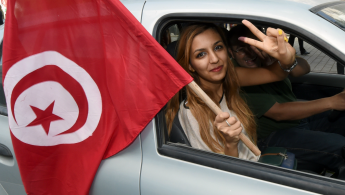The road to Carthage: Three critical days
With just a few days to go, presidential hopefuls are gearing up for the last days of campaigning.
The first round of voting is on Sunday 23 November. A second round may follow in December. And though the election has seen as many as 26 candidates - some have since dropped out - the race is shaping up to be primarily between the sitting president, Moncef Marzouki, who leads the Congress for the Republic party, and Beji Caid Essebsi, who heads the anti-Islamist Nidaa Tounes (Call of Tunisia) party, which has momentum on its side after winning last month's parliamentary elections.
| I will not deny mistakes have been made, and we will work to fix them - Moncef Marzouki |
This weekend will see a flurry of final activity as the hopefuls try to press as much flesh as possible. Last weekend was no different. Marzouki, 69, showed admirable stamina by visiting the critical city of Sfax 170 miles south-east of Tunis before travelling to the even more distant cities of Gafsa, Gabes and Medenine the next day.
He has been at pains to defend his record, while also admitting that it could have been better.
“We have not done anything wrong to this country. We have not stolen or tortured, and we have not been silent in the face of tyranny. But I will not deny mistakes have been made, and we will work to fix them if we are elected."
He has run on a platform committed to the protection of freedoms and rights, national stability and a preference for a national unity government.
But he also tried to strike a statesmanlike tone last week in Medenine. Last month's parliamentary elections were widely praised and Marzouki called on Tunisians to ensure election day on Sunday would similarly be a "source of pride for Tunisia not of laughter."
Marzouki has tried to persuade Tunisians that the elections are decisive for the country's future. For all the praise heaped upon them, voter turn-out was disappointing in October's poarliamentary elections, and Marzouki clearly feels that the more people who vote, the better his chances.
Essebsi, 88, on the other hand, has been trying to ride the momentum from parliamentary elections that saw his party easily beat out the Islamist Ennahdha party - Ennahdha is not running a presidential candidate.
His platform is the same as his party's, calling for a strong, inclusive state that will not tolerate "extremists".
Last week he told supporters that a vote for him would, "bring back the prestige and respect of the state. We will not allow extremist voices to enter Carthage. We will not allow anyone to insult the Tunisian flag. We will protect the country and defend a project that brings everyone together without discrimination or exclusion.”
Nidaa Tounes has also been trying to show that Marzouki’s rhetoric is exclusionary, discriminatory and divisive while batting back questions over Essebsi's health. “I forgive those who are spreading rumours because they are beneath me,” he said last week, before a bravura challenge:
“Do you want me to take my clothes off in front of you all so you can see how good my health is?”
This, predictably, provoked plenty of activity on social media platforms.
Essebsi is crucially supported by the centre-right Afek Tounes party, which came fourth in parliamentary elections. Last Sunday the party threw their full weight behind Essebsi. He was, a statement said, “the best presidential candidate to overcome the difficulties and risks the country is facing.”
But there are other candidates.
Popular Front candidate Hamma Hammami, insists he can reach the second round absent electoral fraud or voter intimidation. He is running on a platform that Tunisia needs new leaders, and in a rally last week in Tunis he pledged to achieve equality across the country. He has also pledged to pursue the truth about political assassinations in Tunisia over the past three years. According to observers, Hammami's popularity is increasing.
And Essebsi has also come in for strong criticism.
Businessman Slim Riahi, the founder and leader of the Free Patriotic Union which took third place in parliamentary elections, also rounded on Essebsi last Sunday. Essebsi, Riahi said, was: “Pushing for bipolarity in the elections, and excluding other candidates by making Tunisians believe that not voting for him was the same as voting for Marzouki. The ballot box, however, will be the ultimate decider.”
This article is an edited translation from our Arabic edition.
Opinions expressed in this article remain those of the original author, and do not necessarily reflect the opinions of al-Araby al-Jadeed, its editorial board or staff.



